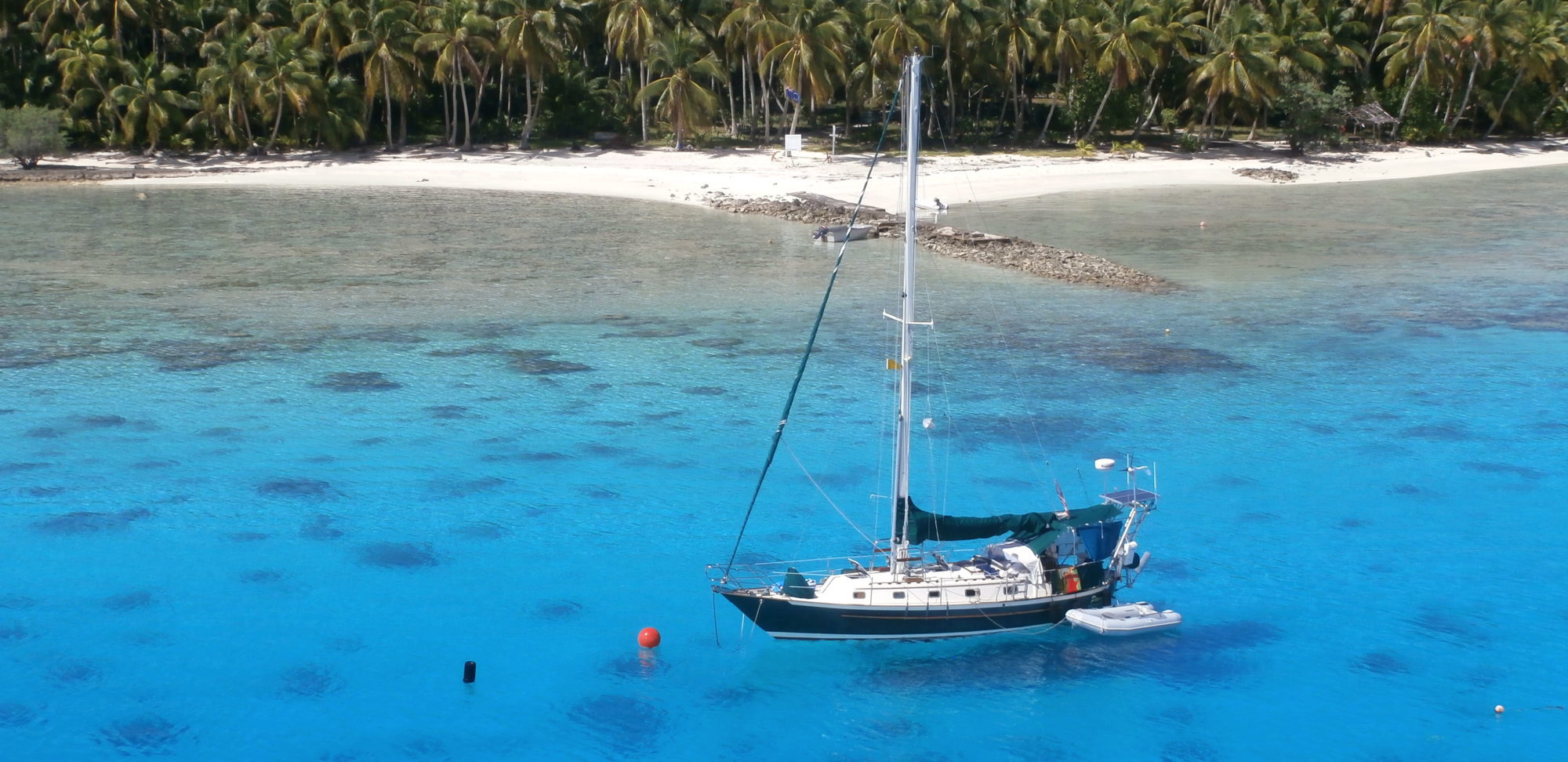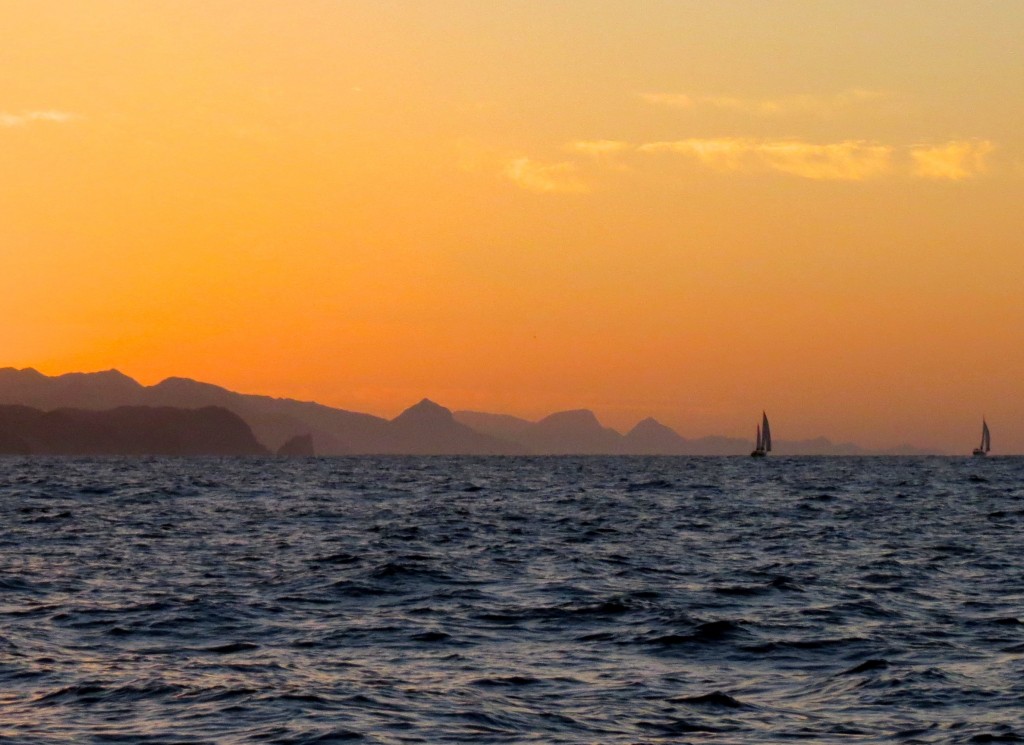With an audible crack, the rain began to come down in solid sheets. I watched it for a moment, blinking. How could it be raining in Baja? The area gets about two inches of rain each year, yet it was now raining three inches in the length of time that it took me to comprehend it.
The half-dozen customers in the small palapa restaurant, mostly cruisers and gringo wanderers, stood up and gawked as well. The sky was a mass of angry gray-black clouds scudding east across the little bay of Ensenada de Los Muertos, the Cove of the Dead. Los Muertos is a good resting point on the way from Cabo San Lucas to La Paz in the Sea of Cortez, primitive and protected, with good holding and a palapa serving wonderful guacamole and ice-cold cervezas. The village fathers want to change the name from Los Muertos to Los Sueños (dreams, deep sleep; illusions), which is good salesmanship.
There were eighteen boats swinging at anchor, probably more than there had been in the previous seven days combined, many of them from the Baja Ha-Ha. Pamela was among them, barely visible through the rain storm that seemed to be getting stronger by the minute.
I put down my cerveza. I had left all of Pamela’s hatches open and now she was getting drenched inside. Paper charts left on the navigation station, the bed sheets in the forepeak, the exposed radio equipment, and my laptop.
The kayak was up on the beach above the high tide line, about a quarter mile away. I couldn’t quite see it through the rain. From the kayak to the boat was another quarter mile. I felt helpless. How could I possibly get to my boat in this rain storm?
I squinted like Clint Eastwood for a moment, then stuck out my jaw like John Wayne. “I’ll be back in a few minutes,” I told Pam.
“I’ll get you another beer,” she replied. What a gal.
I sprang into action. The gawkers stepped aside as I leaped from the open-sided palapa and out into the storm. I ran fast across the wet sand, out across the beach and past the panga fishing boats hauled up on the sand.
I knew what the gawkers were thinking. “Wow, look at him run. He’s sprinting out into this storm, what moxie.”
Winded from the sprint, I reached the kayak where I’d left it at the high tide line, then dragged it into the water and into the surf and leaped inside. With the paddle I stabbed at the water on each side of the boat like a man driven mad. The muscles in my neck and shoulders began to throb as I displaced massive amounts of water. The smooth-bottomed kayak planed across the water as the driving wind whipped the tops off the waves and brought them slashing into me. In a few minutes I reached Pamela She was rolling heavily in the swell and wind; the westerly wind hitting her bow while the Pacific swell from south-south-east pushed hard against her beam.
I grabbed her boarding ladder and sprang over the rail and into the cockpit, then dove down the companionway into the salon. I slipped on the floor, totally wet from the rain coming down through the big hatch and side ports. I quickly closed all the hatches and ports and dogged them down tight, then mopped up the water with a galley towel. The Mexico chartbook was drenched and I wiped it with the towel as best I could then laid it out on a berth to dry.
The ship was now secure, the mess cleaned up, and the work done. The theme from Rocky thundered in my brain.
Gonna fly now …
I felt supercharged. Rather than sitting back down in the palapa and finishing my beer I had done a truly great thing by dashing across the sand and sea to come to the aid of my little ship. It was still raining, but not nearly so hard, as I boarded the kayak again and pointed her back to the beach. The waves were bigger now and steep from the opposing wind gusts and sea swell, and lifted the little kayak causing her to surf fast onto the beach. At the right moment I leaped out and pulled her up onto the beach before the breaking wave could swamp her, then dragged her up to the high tide line.
The decathlon was nearly finished. I stretched out my legs once more as I sprinted across the open beach, humming Chariots of Fire through my ragged breath.
I knew what the gawkers back in the palapa were saying. “Look now! He’s running back. Look at him go, and after paddling hard through those steep waves.”
They would all stare as I bounded back into the palapa dripping wet. They would clear the way for me. Probably one or two would stand and cheer spontaneously, their chairs crashing to the floor behind them, and then the rest would join in, chanting and clapping furiously. The bravest ones would slap me on the back and say, “Good job, old boy, saving the ship like that” while the shy ones would whisper among themselves, “So agile. How does he do it?”
The beach past the fishing fleet became rocky and I stepped hard on a shell with my heel. It hurt. I sucked in my breath and continued jogging, wiping the rain from my eyes with my soaking shirt sleeve.
I paused outside the palapa to wipe my sandy feet. The gawkers were there. They hadn’t watched me come up from the beach. They were all peering intently into their smart phones.
“Oh, you’re back already,” said Pam. “Everything alright?”
“Yes. I took care of it. Where’s my beer?”
“Oh, the waiter took it away. I didn’t order another one. I didn’t know when you’d be back. Look! The sun’s back out.”
The rain had stopped and a little sunshine was poking through the clouds. In a few minutes Baja returned, sunny and warm and starting to dry.


Great writing! Keep it up. Sounds like you are enjoying the adventure. And it just gets better!
Ah, palapas, I remember them, south of Puerto Vallarta. At the beach at Yalapa, or was it a yalapa at Palapa? Who knows. Great stories, glad you are well and making progress… or at least doing well sitting still. Progress seems to have little relevance at this point — what a great concept!
Even with the down pour, still wish i was there. Thanks for sharing.
What a riveting tale of daring do! My heart it still pounding! 🙂